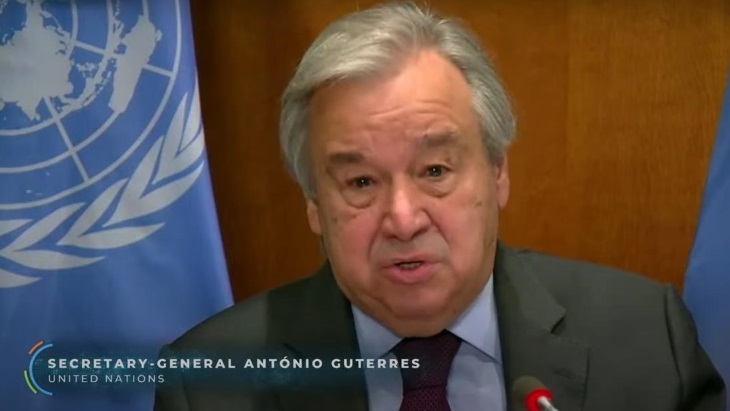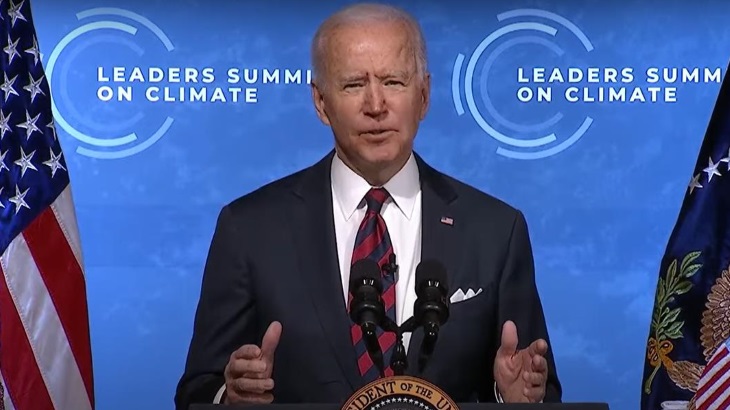On his first day in office as the new US president, Biden on 20 January signed the country back into the Paris Agreement. He launched a 'whole-of-government' process, organised through his National Climate Task Force, to establish the 2030 emissions target - the USA's new nationally determined contribution - that he announced today.
According to a White House statement, the USA has set a goal to reach 100% carbon pollution-free electricity by 2035, which includes leveraging the potential of power plants retrofitted with carbon capture and existing nuclear energy. The country can address carbon pollution from industrial processes, it added, by supporting carbon capture as well as new sources of hydrogen - produced from renewable energy, nuclear energy or waste - to power industrial facilities.
"When people talk about climate, I think about jobs," Biden said during his speech to open the summit. "I talked to the experts and I see the potential for a more prosperous and equitable future. The signs are unmistakable. The science is undeniable that the cost of inaction keeps mounting. The United State isn't waiting." On the target to halve emissions by 2030, he said: "That's what we can do if we take action to build an economy that's not only more prosperous, but healthier, fairer and cleaner for the entire planet."
But the effort to achieve net zero by 2050 must be a global one, he said. "The United States represents less than 15% of the world's emissions. No nation can solve this crisis on our own. All of us, particularly those who represent the world's largest economies, we have to step up."
Referring to the United Nations next round of climate talks - COP26 in Scotland this November - he said: "The steps we take between now and Glasgow will set the world up for success, to protect livelihoods around the world and keep global warming at a maximum of 1.5 degrees Celsius. We must get on the path now in order to do that. If we do, we'll breathe easier, literally and figuratively. We'll create good jobs here at home for millions of Americans that will lay a strong foundation for growth in the future. That can be your goal as well. This is a moral imperative, an economic imperative, a moment of peril but also a moment of extraordinary possibilities. Time is short but I believe we can do this. I believe we will do this."

UN Secretary-General António Guterres thanked Biden for "walking the talk" with the new target from the USA.
"Mother Nature is not waiting," Guterres said. "The past decade was the hottest on record. Dangerous greenhouse gases are at levels not seen in three million years. The global temperature has already risen by 1.2 degrees Celsius, racing towards the threshold of catastrophe."
Guterres called on the leaders taking part in the summit to build a global coalition for net zero by the mid-century. "By making this a decade of transformation, all countries, starting with major emitters, should submit new and more ambitious nationally determined contributions for climate mitigation, adaptation and finance, laying out actions for - and policies for - the next 10 years aligned with the 2050 net-zero pathway."
Leaders need to translate those commitments into concrete and immediate action, he said, adding that, so far, only 18-24% of pandemic economic recovery spending is expected to contribute to mitigating emissions, reducing air pollution or strengthening natural capital.
"The trillions of dollars needed for COVID-19 recovery is money we are borrowing from future generations," he said. "We cannot use these resources to lock in policies that burden them with a mountain of debt for a broken planet."
The world must put a price on carbon, shifting taxation from income to carbon and subsidies for fossil fuels, he said. It must ramp up investments in renewables and green infrastructure. It must stop the financing of coal and the building of new coal-fired power plants, and phase out coal in the wealthiest countries by 2030 and by 2040 "everywhere else". And it must ensure a just transition for effective people and communities.
"To build a truly global net-zero coalition we need a breakthrough on finance and adaptation and this is critical for trust and collective action," he said. "Before COP26, we need concrete proposals that give access to greater financial and technological support for the most vulnerable countries. Developed states must deliver on public climate finance, including the promise of USD100 billion per year for climate action in developing countries at the G7 summit in June."
He was encouraged, he said, by the mobilisation of the financial sector around the Glasgow Financial Alliance for Net Zero, a new initiative from the US and UK governments, the first 160 member firms of which collectively represent USD70 trillion of assets under management.
"Let us now mobilise political leadership to move ahead together to overcome climate change and our war on nature, and build lives of prosperity and dignity for all," he said.





_47120.jpg)
_23621.jpg)

_63865.jpg)





